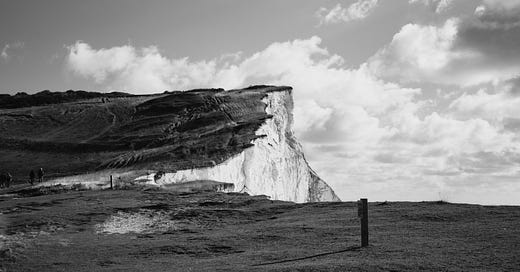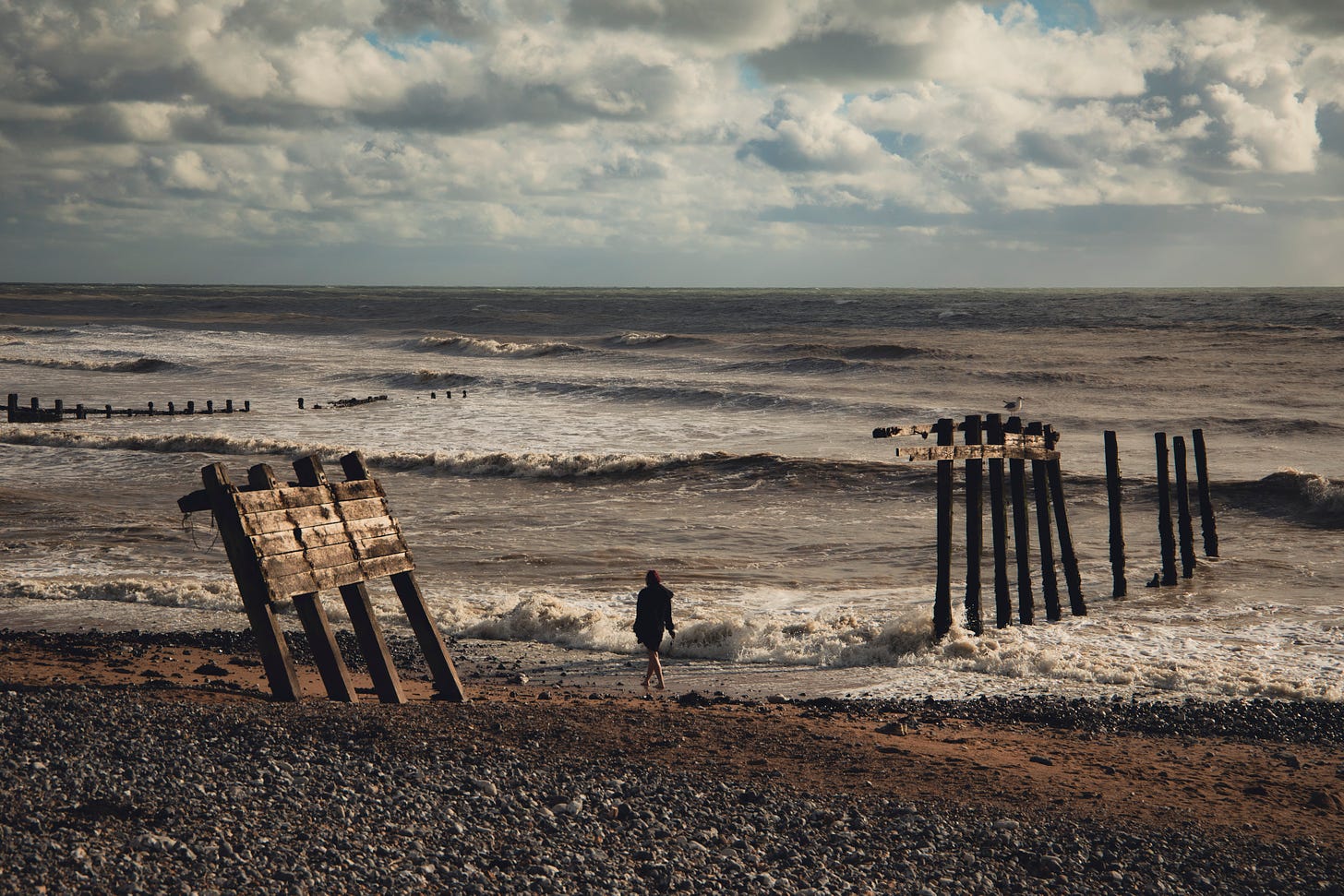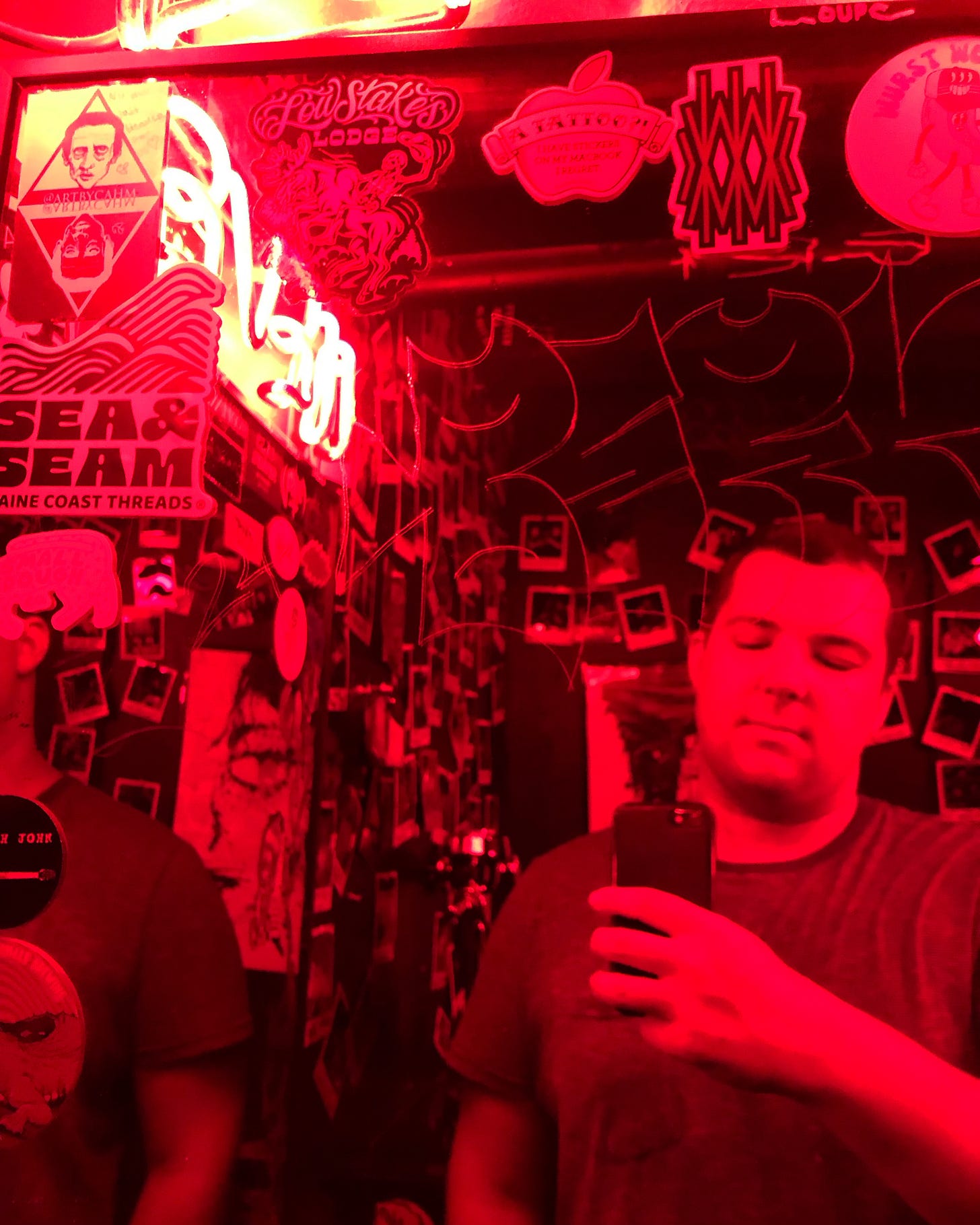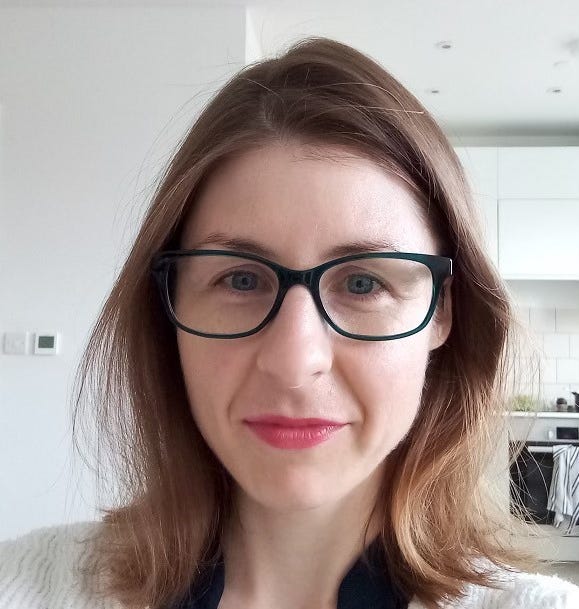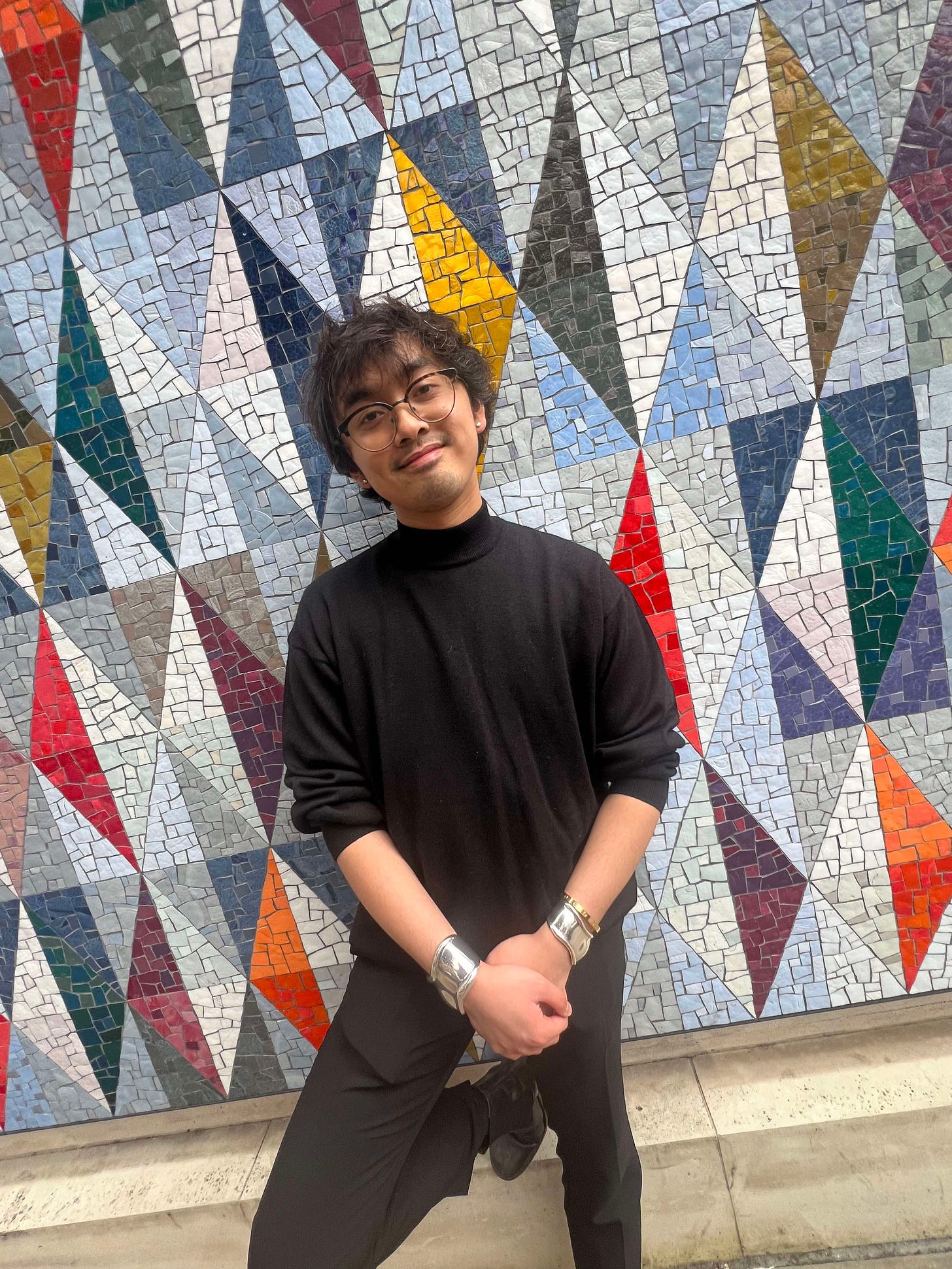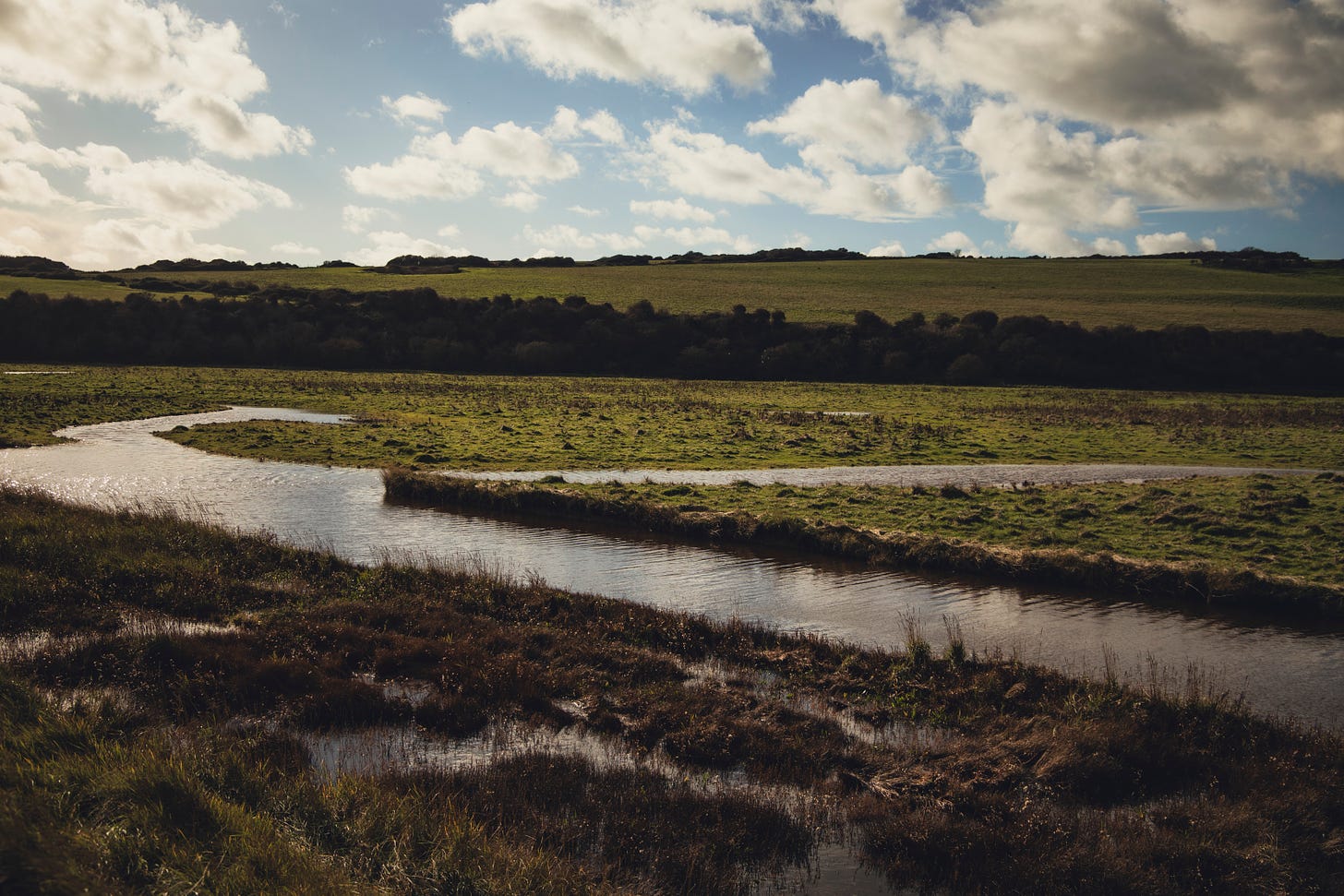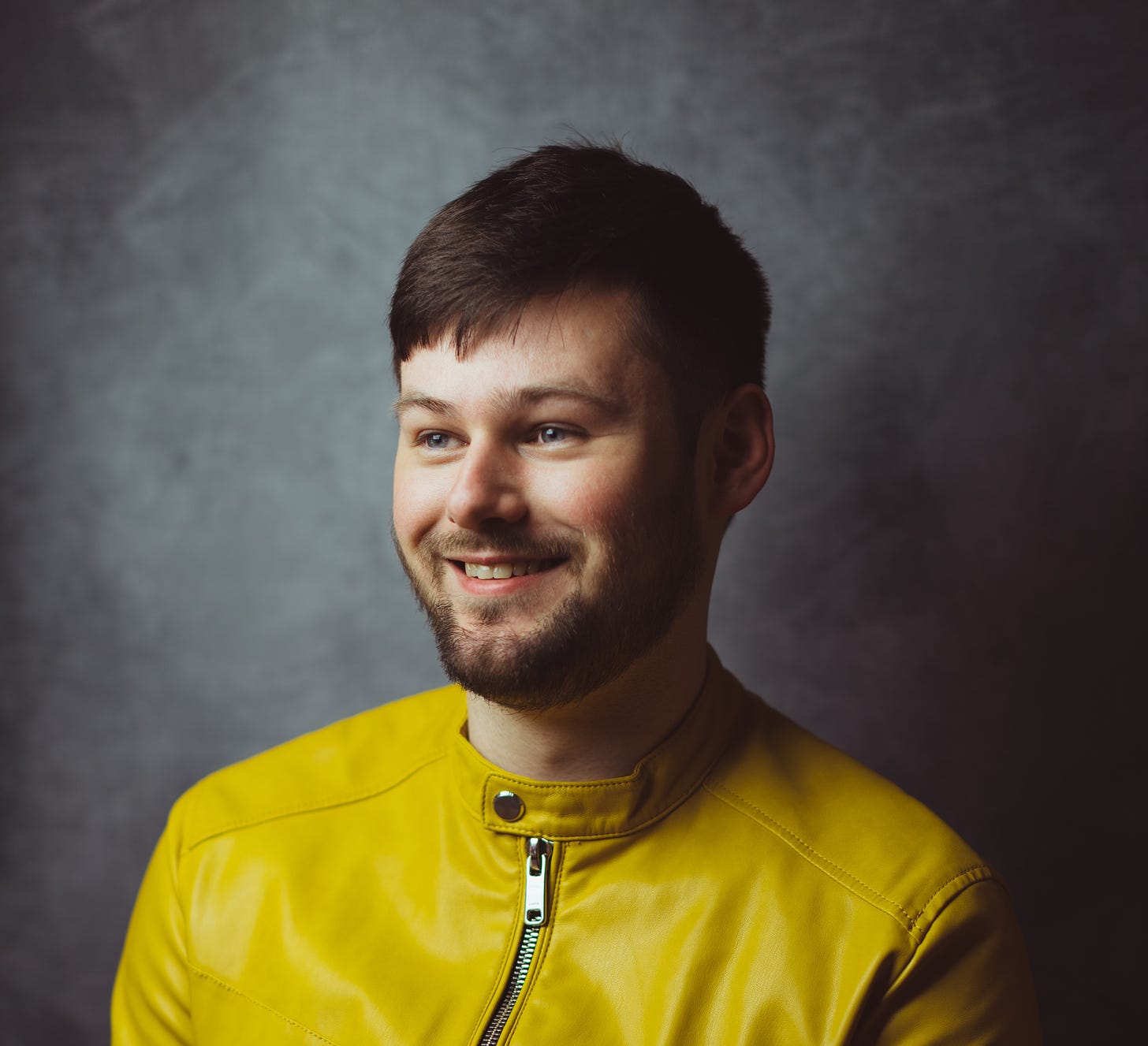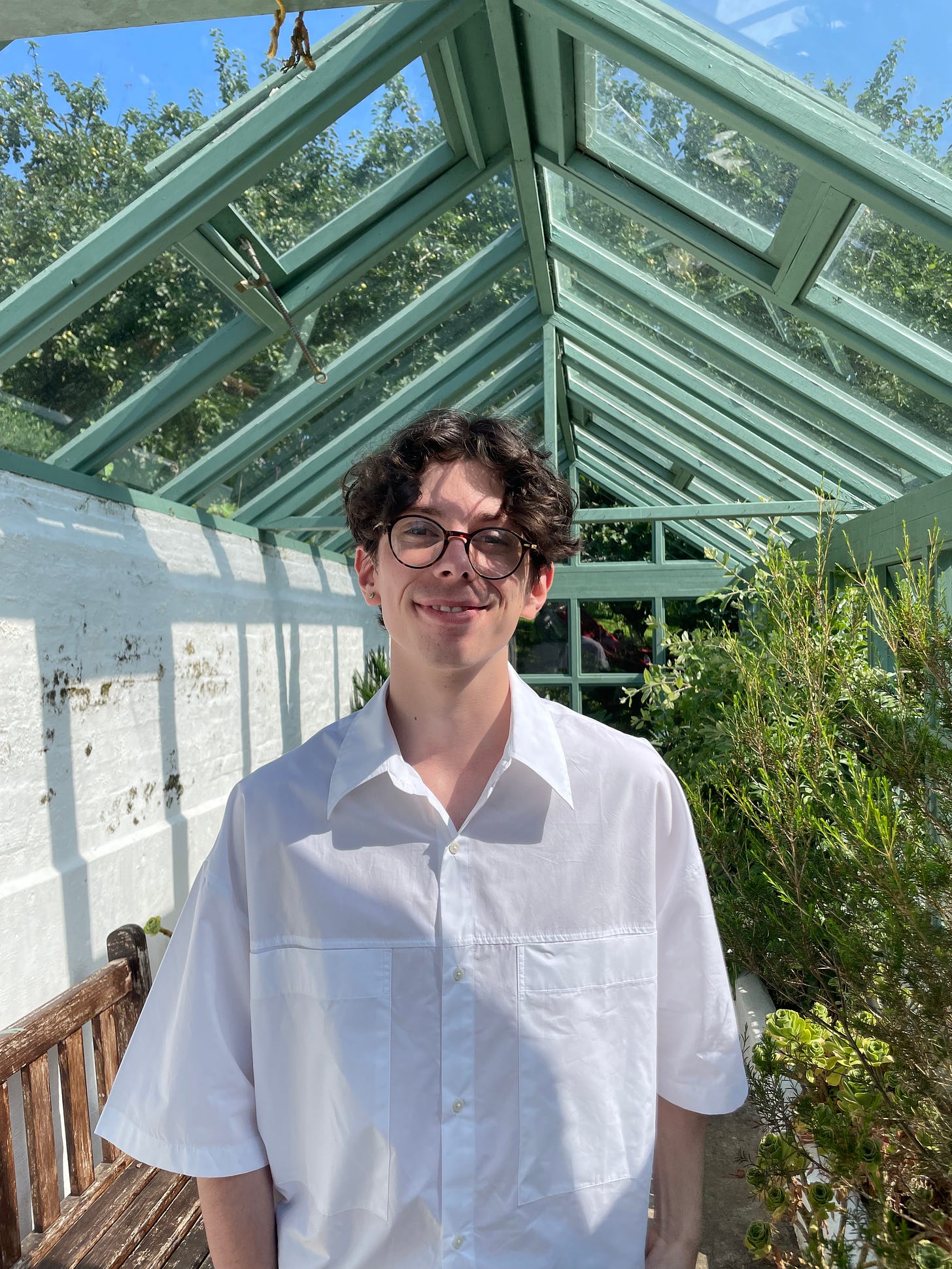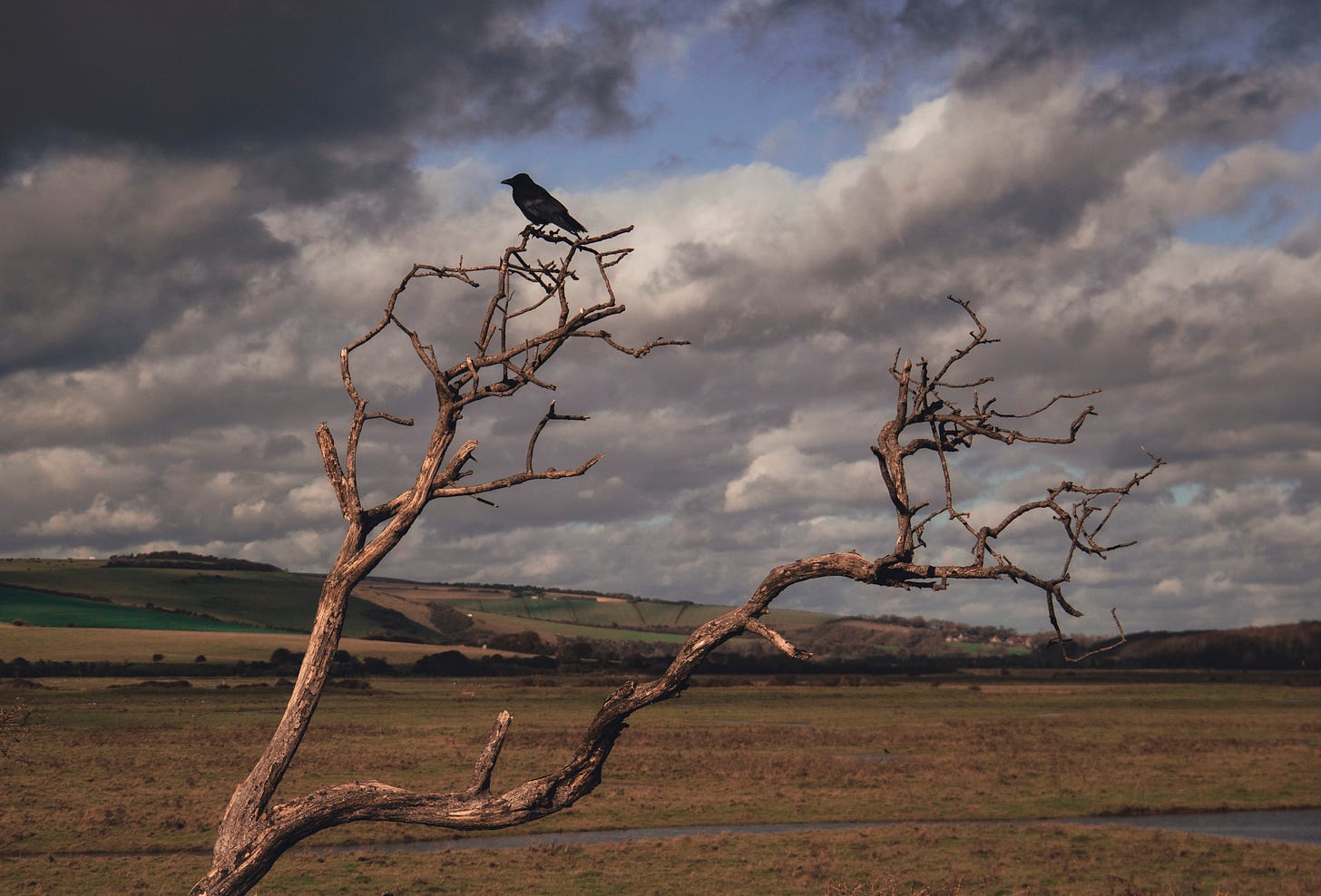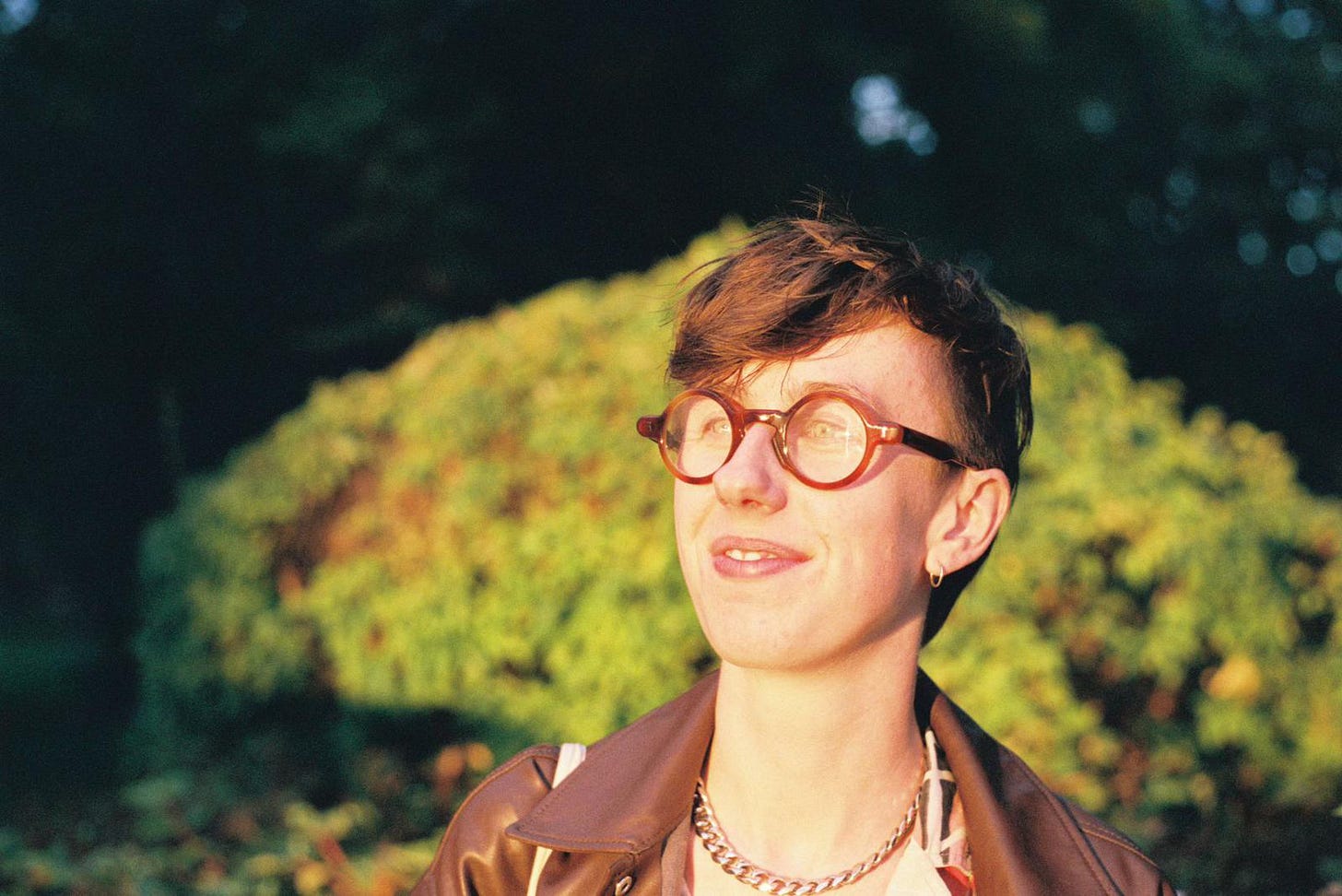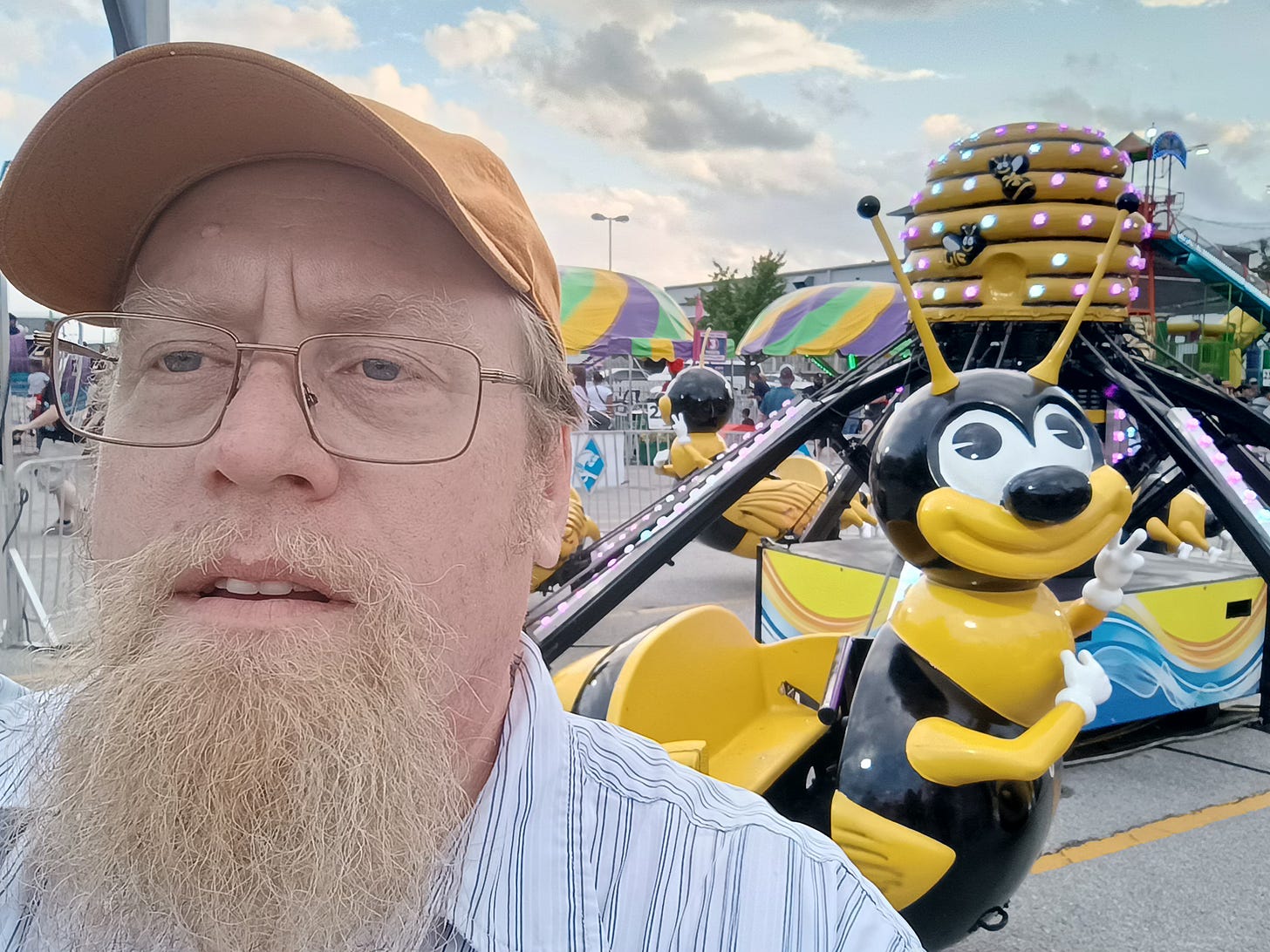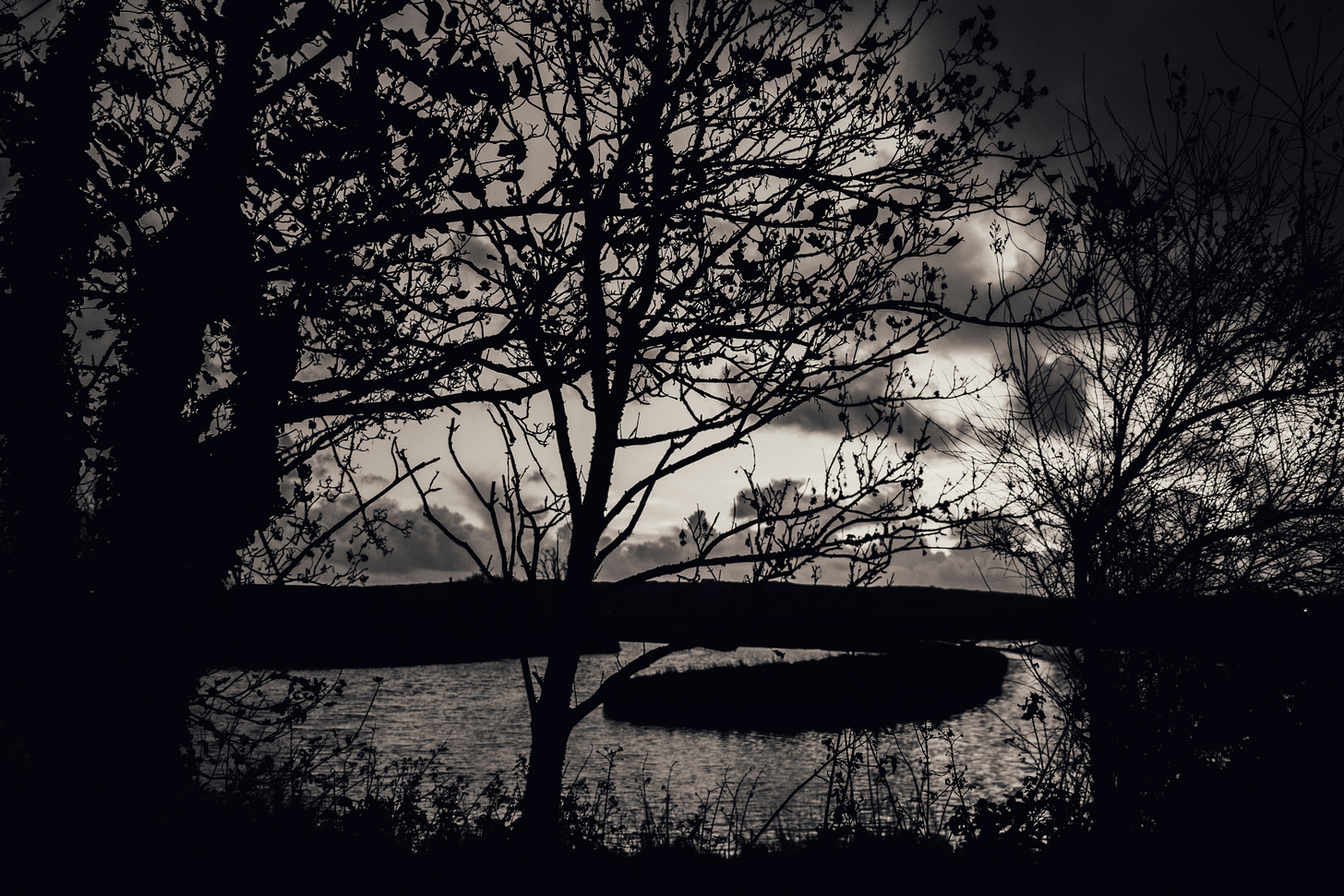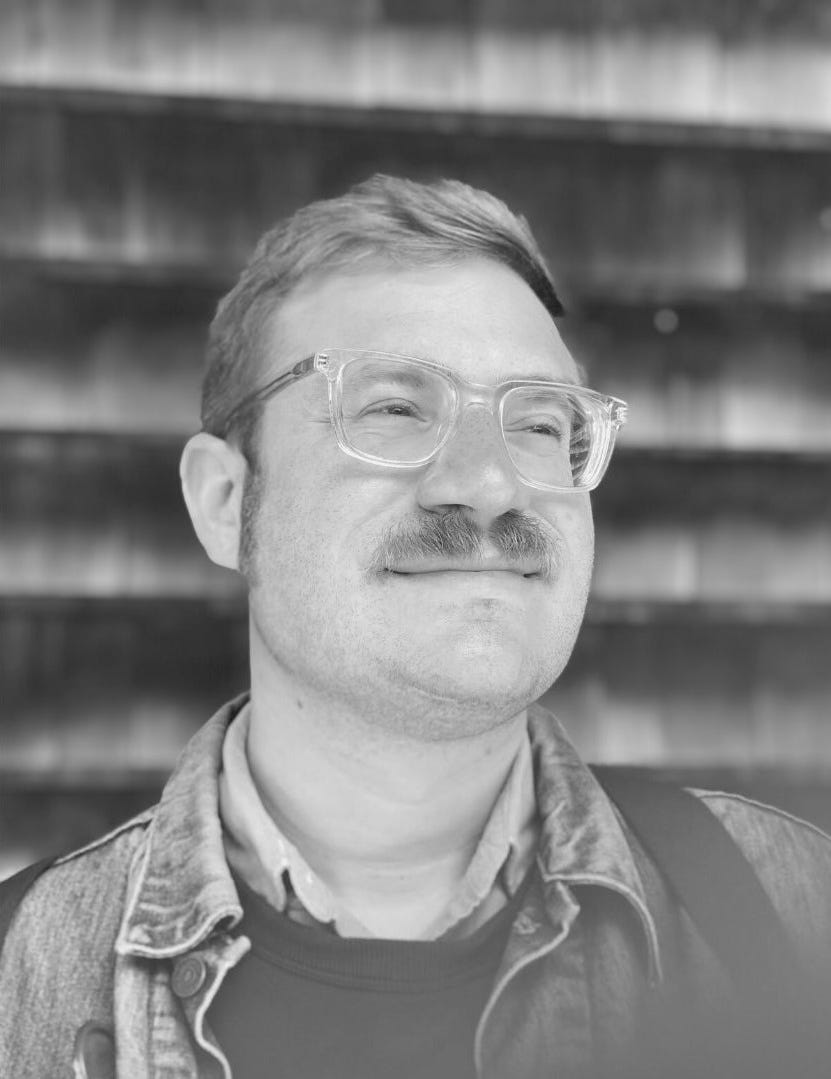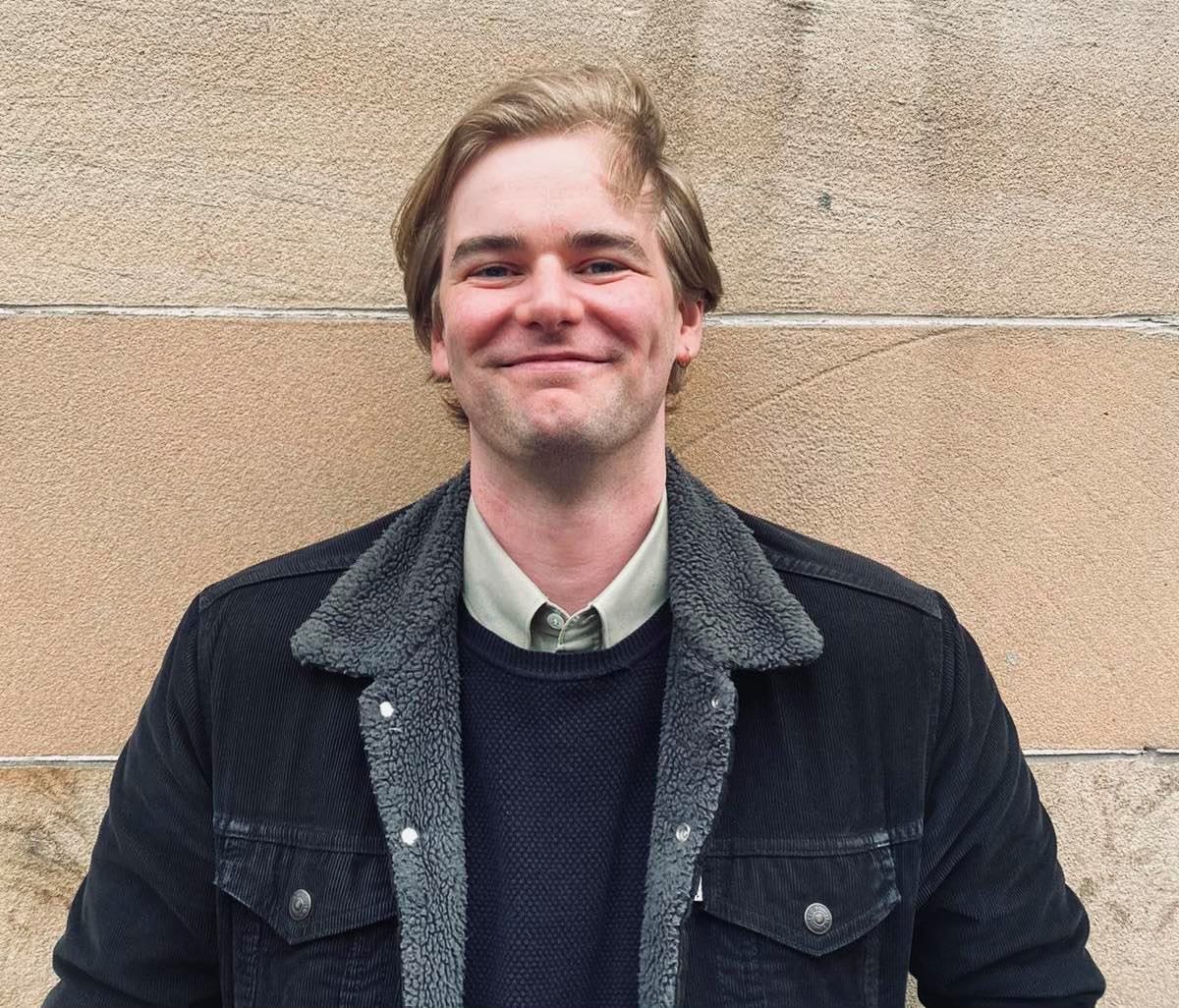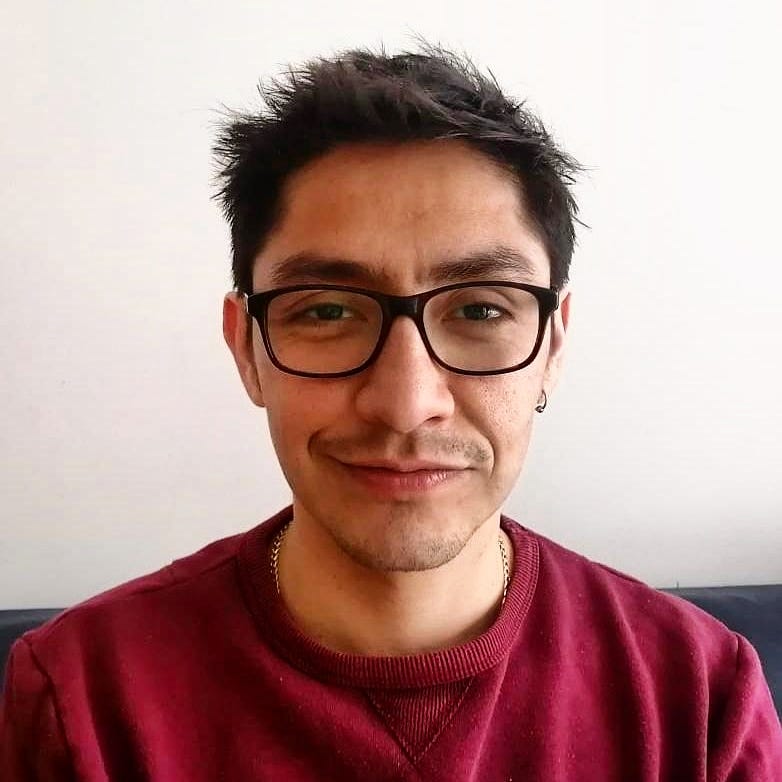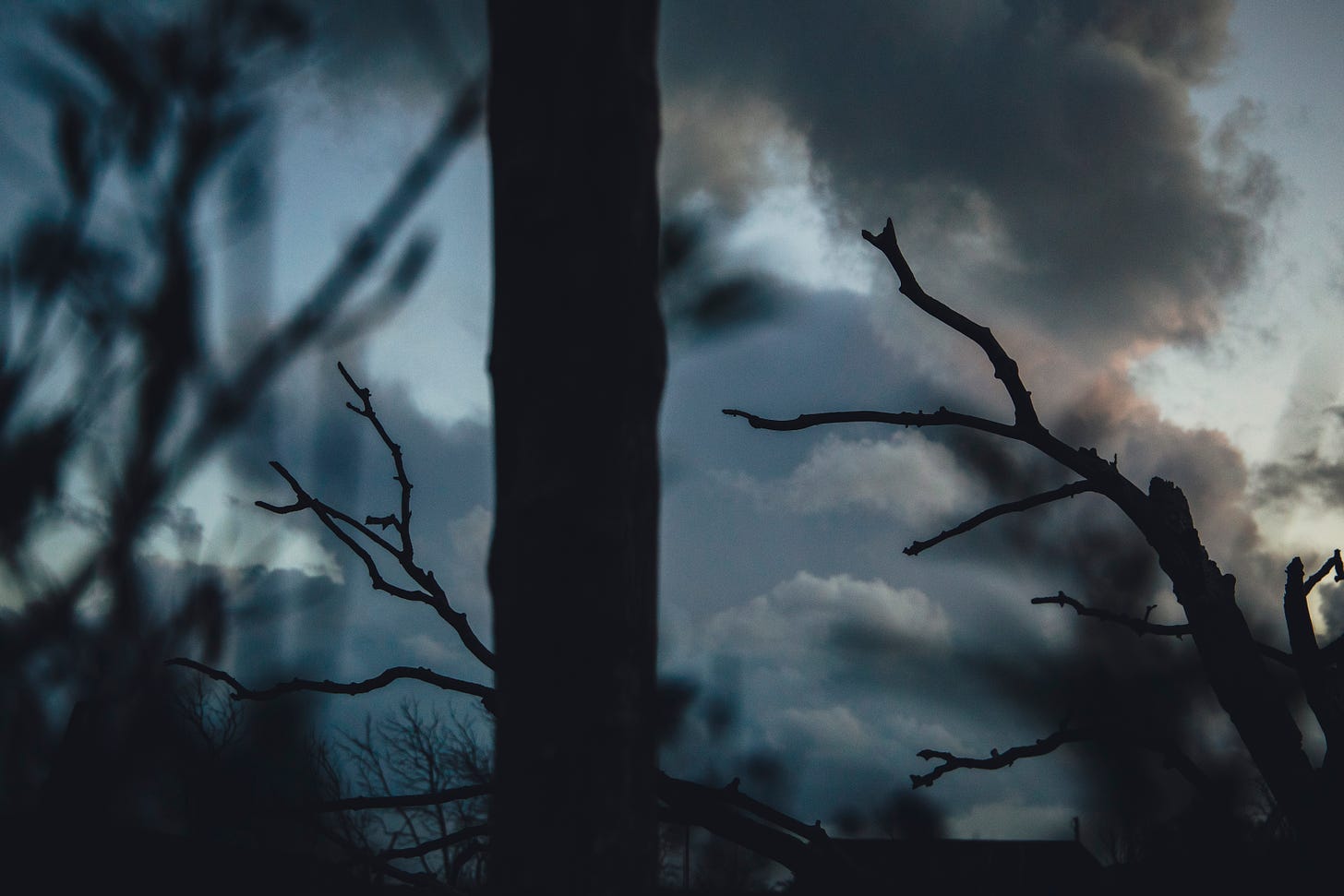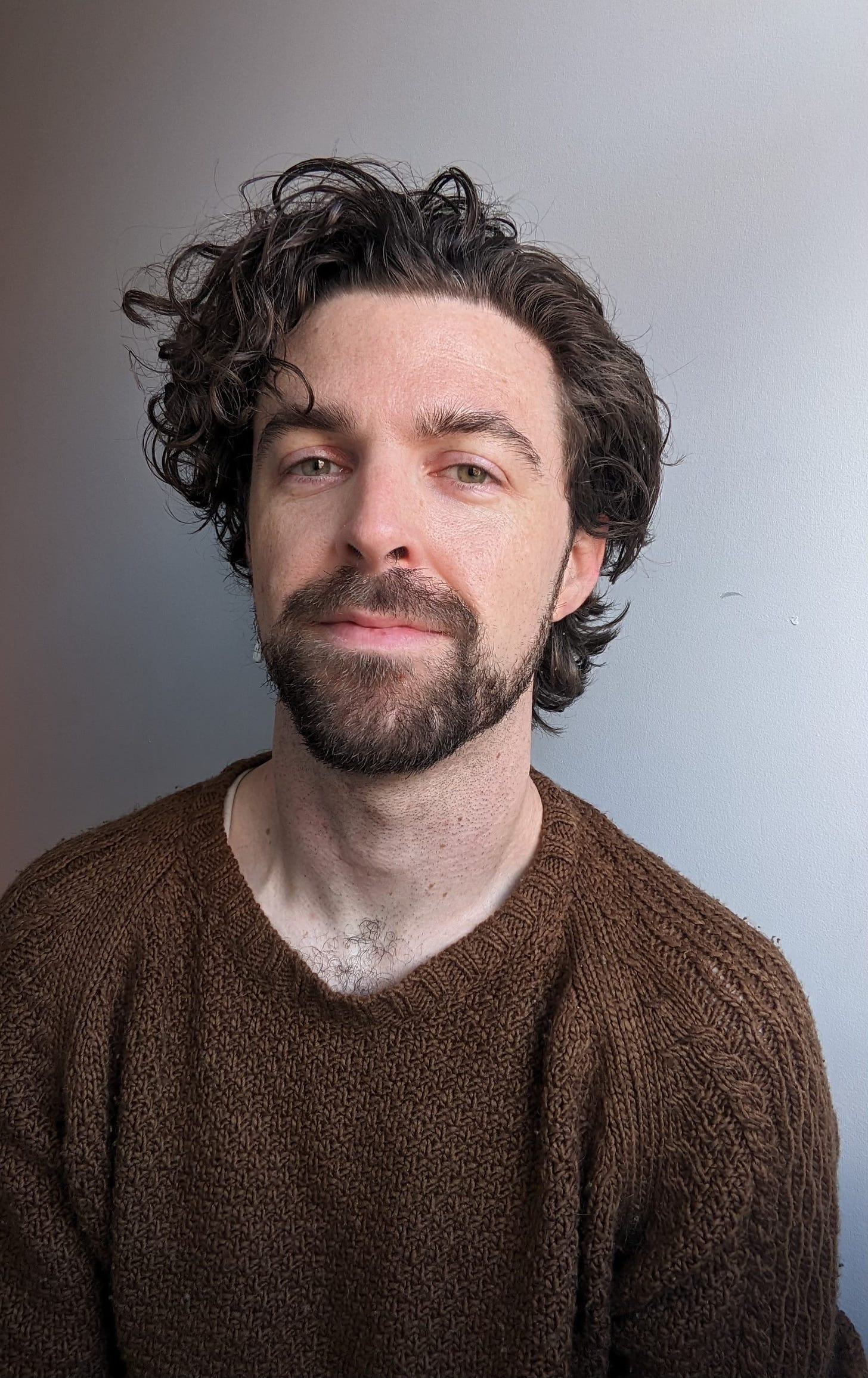Issue One
Featuring Woodstock, threesomes, Saint Ursula of Cornwall, Essex Hemphill, and much more.
Introduction
Welcome to the first issue of the Seaford Review, a new magazine for poetry. We’re glad that you’re here, and hope you enjoy reading the poems included in this issue just as much as we did when making our selections.
Chris, Jack, and Luís met just over a year ago on a trip to Jack’s parents’ house in Seaford, East Sussex, on the south coast of England. Jack and Luís were already friends, and Luís and Chris had previously met and connected online. Coming together as a group has proven to be the beginning of a fruitful and rewarding relationship, which has led to many wonderful exchanges — on matters poetic and otherwise — culminating in the three founding the Review. We sincerely hope that this issue will be the first of many to come.
Making the selections for this issue has been a learning experience for all of us. We received close to a thousand poems, a number significantly higher than we’d expected for issue one. As editors, we’ve been charged us with the responsibility of paying attention to a large number of poems, articulating what we felt worked or didn’t work about each poem that we read, and ultimately deciding which of those would fit together in a single issue. We’re incredibly grateful to everyone who trusted us and chose to submit: as writers ourselves, we know it’s not easy to put oneself out there — so, thank you!
We know we’re not perfect, and hope to keep doing better as time goes on. You can reach out to us here, by leaving a comment at the bottom of the newsletter, or else online, @seafordreview: we’d love to hear any thoughts and comments our readers may have on how we’ve done. If you did enjoy reading this, please do take a moment to share with friends and loved ones, on social media and elsewhere. And keep an eye out for our interview series, which will shine a spotlight on some of the authors in this issue.
— Chris, Jack, Luís
Images of Sussex found in this newsletter were provided by the wonderful Pedro Younis, who can be found online at @pygphoto.
Note: some of these poems won’t display correctly on smaller screens. We recommend reading this issue on a desktop computer, with a larger screen, if you’d like to see the poems as their authors submitted them to us.
Table of contents
At the Condo in Woodstock
Lethargy
Third
11,000 bottles wash ashore with messages from the virgin followers of Saint Ursula of Cornwall
Ode to Yu-Gi-Oh
Soy boy
To Bear Witness is an Act of Love
Desert Dreams
Nub
The Trojan
Waning Gibbous
Prompt
Harvest scenery with blind greyhound
Spark bird
Homosexual Commitment Issues While Hundreds Of Elk Die In Wyoming
Kevin Bertolero
Kevin Bertolero is the founding editor of both Ghost City Press and & Change, a journal of gay poetry. He earned his MFA at New England College and he is the author of Love Poems (Bottlecap Press, 2020) and Forever in Transition: Queer Futurist Aesthetics in Gay Cinema (Another New Calligraphy, 2021). His poems have appeared in The Cortland Review, Fourteen Poems, Olney Mag, Hanging Loose, Post Road, and elsewhere. He lives in Portland, Maine.
At the Condo in Woodstock
For his birthday, I buy Gabe a set of rocks glasses with soapstones and a bottle of Lake George whiskey. Alone in my bedroom downstairs, he thanks me, but won’t meet my eyes. There’s something you want to say, I say. Outside he looks me over, though his friends can’t tell in the dark— flood light shades the yard. His bocce ball falls into the gully so I hold his hand, lower him down to retrieve it. Dirt covered shorts, now, and it’s so humid—he pulls off his shirt. Knows what I want. And he’s a showoff. A good one. In bed, finally, I leave my door unlocked. You’re my best friend, he tells me on the highway home. The best, he says. The best.
Susan G Byron
Susan Gordon Byron is a poet and non-fiction editor in London. In 2023/24, her poetry has appeared in Dust, tiny wren lit, Mechanics' Institute Review and Frazzled Lit, and is forthcoming in Pissour. Following a NCTJ postgraduate diploma in newspaper journalism, she worked at the Catholic Herald for two years. She hosts The Culture Boar Podcast. You can find her on X @cultureboarpod
Lethargy
Lie like a cut worm a dead emperor an eyelid lie like the face in someone else’s head lie like bark the gaze on the bark the unthinking thought on the gaze on the bark.
Troy Cabida
Troy Cabida is the author of Symmetric of Bone (fourteen poems, 2024) and War Dove (Bad Betty Press, 2020). His recent poems have appeared in Bi+ Lines, 100 Queer Poems, and Tiffany & Co, and has been shortlisted for the Bridport Prize for Poetry 2024. His debut collection, Neon Manila, is forthcoming with Nine Arches Press in 2025.
Third
The cold feels refreshing against what remains bare of our bodies, now a symphony of scents. We give each other notes, then laugh, slings his arm around my shoulder to change topic. The side of his torso is soft, I didn’t notice it then, his hand encompassing mine. This is all temporary, anyway, so we wait for the cycling man to blur past us before we kiss, slower this time, no one to tell us to focus. I expect to taste him, the other, back in his flat cleaning up after our mess: the spilled water, the broken coffee table, the wet doctor’s notes, the half empty bottles secure in darkness all over again.
Jack Cooper
Jack Cooper is a science communicator based in London. His poetry has been discussed on BBC Radio 4, commissioned by the Science Museum, and translated into Czech and Romanian. His debut pamphlet, 'Break the Nose of Every Beautiful Thing' (Doomsday Press), received the Society of Authors' Eric Gregory Award. Discover more of his work at www.jackcooperpoet.com
11,000 bottles wash ashore with messages from the virgin followers of Saint Ursula of Cornwall
“She led us through Westphalia, a congregation
weaving down the Rhine like a many-headed snake”
“we were ambushed by bandits, a great force”
“riding horses like arrows ride wind”
“crashing down the hillside like an avalanche”
“a collapsing dune”
“the valley filling with bodies
and the flashing of swords in sunlight”
“she demanded an audience with their leader”
“Ursula tried to escape”
“her eyes bright as pole stars”
“her gaze turned groundward”
“defiant”
“obliging”
“... but she was killed in cold blood”
“our Little Bear...”
“her chest a hollowed barrow”
“we ran with no food but the maggots in our wounds”
“there is nowhere to hide
a fox in every hole, lugworms in every burrow”
“willows brush the riverbank
a canopy of reflections”
“we have our faith”
“we have each other”
“we have until dawn”
“... when your enemy besieges you, you will eat your own children,
the flesh the Lord has given you...”
“we followed Ursula through Christendom,
eleven thousand daughters
with Christ alone as her husband”
“all roads lead to Rome and all rivers
to the sea”
“I send this with the hope that the current carries it to you”
“Sister, I send my love”
“my regret”
“my testimony”
“and remember
we are only ever one breath apart”Ode to Yu-Gi-Oh!
Byzantine trading card game: you taught me maths and materialism, how to rule the school economy with a cardboard fist, closing deals behind the bike shed. You taught me to use what I have to hand, that faith in small things – the luck of the draw, friendship – might be rewarded. Even now, I’ll play a round, laying out Spell, Trap, and Monster cards: colour swatches of my childhood. Grass stains on summer shorts. Lighting violet candles for Lent. The faint yellow of a bruise that is close to healing.
Nathan Copeland
Nathan Copeland (he/him) is an emerging queer poet and storyteller living in the quiet of rural Cornwall with his partner and their tabby cat named Toad. His work has previously been published by Broken Sleep Books in their 2024 anthology titled Masculinity: An Anthology of Modern Voices. You can find him romanticising life on Instagram @nathan.copeland_
Soy boy
Boy as in the smell of freshly mown grass. Flies in your eyes. Sunrise but not sunset. Boy as in the divine right of kings. The retaking of constantinople. As in the taste of childhood nostalgia on my tongue. Except it’s sour like skittles. Boy as in wearing mum’s high heels. Feeling so tall. As in drawing on the walls in green highlighter. The arrangement of the flowers on the dining room table. Bent. Boy as in not quite man. As in not not girly. Boy as in Princess Di’s sweaters. The smell of the train on a four hour ride. Boy as in mud on your knees. Sweet like vimto. Fizzing like balloons popping on the dancefloor. Boy as in the softness of peaches. The creases of the leather sofa. Sticky. Boy as in skinny dipping in cold, cold water. Nosebleed on the floor. Almost filling out the space. One droplet at a time.
Cleo Henry
Cleo Henry (they/them) is a London based poet with an interest in queerness, giant squid and the apocalypse. They released their first pamphlet, The Last Lesbian Bar in the Midlands, with Fourteen Poems. They have also been published in Ambit, Selkie and by Banshee Press, Cipher Press, Pilot Press and Broken Sleep Books.
To Bear Witness is an Act of Love
I knew it the morning the dogs were hanged,
one rope taut across the bridge, two quiet
lodestones. I knew then to look hard and quick
before the rope was cut, the bodies swept off
to Leicester or some place of old industry.
to see it is to tell it later, to promise.
their boney backs, how all denied hearing
which man did it, which barn door grinned open,
which chorus of kids watched from the knoll
where they made out with peachy doppelgangers.
I left when my dreams began itching, prickled
by the burr of a noose, a gulping fall —
through their softly eyes, through necks askew,
the dogs would have seen each other, too.J T Kelly
J-T Kelly is an innkeeper in Indianapolis. He lives in a brick house with his wife, their six children, his two parents, and a dog. Debut chapbook Like Now (CCCP/Subpress, 2023).
Desert Dreams
The freedom I habitually ascribe to you—I don’t have those kinds of categories at my disposal. Travel and fashion, but it’s the facility of thought, not just the nouns at play. The question of personality first arose in New Mexico. Would we form our own school, and whom did our circle circle around? When we hiked up into the saddle at night, did we all go? Pete—from Ithaca, NY who drove drunk— read Plato and bought a low-slung ranch he invited us to— those of us who couldn’t afford to fly home for anything less than semester break. I cracked my forehead open playing football in his yard, and it was the kind of split we none of us could get past. I did visit Chris once in Corpus Christi, and it was as if we had never, even though it had been two years. And the next anybody heard of Chris he had married uncomfortably young.
Nub
Take something
you said to me in front of the unlocked.
Later on I thought about that.
How the light came through the window as if violently thrown,
and it lay there with its shadows
across your body—like a net, sure, but like a scaffold.
How many years since then, and I still
look on what we made?
The city juts at the edge of the desert.
It rains every day at three o’clock for fifteen minutes
like a manager sponging the forehead of his fighter.
There were many ways the desert laid claim.
Sunlight there has a way of moving, always ahead of you,
illuminating things you can’t see
by staring out into the desert.
Of course I took it. Why else would I be telling you this?T. S. Leonard
T.S. Leonard (he/they) is a disco poet time machine from Kansas City, Missouri who lives and teaches in San Francisco. Leonard's poems have appeared in & Change, Foglifter, and fourteen poems. Leonard appeared as a Visiting Teaching Artist for Poetry Foundation's 2024 Forms & Features workshop series and as a poetry finalist at the 18th Annual Saints + Sinners LGBTQ Literary Festival. He runs the weekly newsletter Emergency Meditations: Poetry in Urgent Times as Peace and Possibility.
The Trojan
A battle is fought, again, in its memory. Its widowed lovers, and echoes of shells. The songs. Ours was a war like any other: youthful, private. With time, I came to remember best that easy summer just before—he was soft, covered in gold fuzz, its wiry ends holding each to a drop of blue as he stepped out from the water— their recollection, each, a story kept of their nation, the larger sea; his calves, the battlefield. Our age a brutish storm: courage came to us piecemeal, and slowly in its smallest gestures— dinners after marching, kissing on the marble steps; the patchwork spoils of struggle, our brave and tender intimacy.
Stuart Rawlinson
Stuart Rawlinson (he/him), is a writer living in Glasgow, Scotland, where he works as a software developer. Previous poems have been published in Magma, Frozen Sea, strings, and Ink, Sweat and Tears, among other places. His micro-chap main args was published with Ghost City Press as part of their 2021 summer series. In 2022 he was selected as one of four mentees for Clydebuilt 15, through St Mungo's Mirrorball.
Waning Gibbous
I thought I'd never see these pinions / go grey / I admit / you get a little tired of the same old tropes / my mister's eyes are nothing like / the ninth largest object in the solar system / all the boys these days with their cheeks / smooth like wheeled clay / stretch your talons / fill my cup / look for heroes / on the dancefloor or at the bar / in the undergrowth / build a neat little nest from all these fictions we gather / but do you remember those claws / on your shoulders? / would you like to buy me a drink? stop trying / to tie your tides to fashion / that moustache will never work / there's still time for a god to fold me into the stars / people will tell you it's cold out there / that no one could take flight / holding me in his arms / but that's the deal / Ganymede / trust me – you wouldn't want to be on an urn forever / and I should be enough / to carry his lightning / no, don't speak / just look me in your eagle eyes / put this beak in your hands and polish / tell me what stares back at you
Prompt
Jump-start. Write as poem as fast as you can. Write a poem with your other hand. Make me feel something. Tell me about the time you were wandering a desert and came across a worn, weathered statue. Tell me about the first time you found yourself in the pilot seat of a giant robot, ready to defend your city. We don't have the time for the usual preparations, or the loading of our atomic fuel. Make something happen and change my life. Quickly. Write a poem from another perspective. Tell me how us monsters feel when we start marching towards your doom. Personify autumn. Personify the age. Write a still life or try to turn your last tantrum into a villanelle. Make a full stop sound like a train pulling away, for me. Show me all the moves you can do from inside that machine as strong as a building. Give me something profound, forthwith. Show me your giant sword. Put down on paper that poem you lost when you tried to translate the idea into a computer. Write the poem while standing upside down. I want to see where your thoughts take you, I want you to inhabit a wandering mind. Show me you can do anything you want with your head up here in the clouds. Find me a rhyme for, oh, I don't know, Godzilla, maybe. Aren't you sick of defeating him, yet? Don't you ever get tired of wrestling otherworldly beings to the ground with your artificially enhanced strength? Show me where the emergency exit is inside this thing. Pull that lever for me. Do it now.
Roberto Salvador Cenciarelli
Roberto Salvador Cenciarelli is an Italian poet of Chilean origins based in London. He is the recipient of the 2023 Chelsea Arts Club Trust award for writing and has just been long-listed for the 2025 Pat Kavanagh Prize. His work has been recently published in Propel Magazine and is forthcoming in Oblique House. He just graduated with an MA in Creative and Life Writing at Goldsmiths University.
Harvest scenery with blind greyhound
After Essex Hemphill
September vines. In my palms, freshly plucked grapes. Baskets passed around from hand to hand. A mythology of white vests and gold chains rolling time into a smoke. Pork chops brown, dripping fat over embers. Children shoot index fingers at each other, feigning death against a metal fence, theatrics of Tupperware lids about to unclip. None of this is in the photograph. Through the lens, I’m the boy trying to figure out the best way to manufacture a smile. Arms camouflaged around my cousins’ shoulders — out of frame a barking you’ll never get to hear.
Spark Bird
n. a species that triggers a lifelong passion for birding
—The Audubon Dictionary for Birders
1
A male singing on dunes,
the blog says, was the towhee propelling
Dave’s interest in bird-watching. Joel could hear them
cooing. His mum taking him to the rooftop to see iridescent
pigeon necks wrestle
over breadcrumbs. Spark bird, first bird, since I heard
the words, I cannot stop
reading the stories of these men who allowed themselves
the pleasure of looking
unabridged.
2
Boy across the road
whose beauty was an early childhood
spent in America or boy whose brother taught us
how to jerk off
(instructions all wrong) or boy in fancy dress I chased
across tables for the length of a restaurant meal,
age 9 or 10,
whose was the first
plumage I laid
eyes on?
3
Rose Garden sundown, men step into a pond
of shadows, craning like swans,
looking at what they are
not meant to
look at
during the day. White
petalled bush; hesitant,
a finger emerges
pointed
at me.William Summay
Will Summay (he/him) is a poet and psychotherapist based in Pittsburgh, PA. Through writing, he explores queerness, nature/ecology, and the affective possibilities of eroticism and loss. He has been published in the Michigan Quarterly Review (forthcoming), & Change (forthcoming), Stone Of Madness, Volume Poetry, among others.
Homosexual Commitment Issues While Hundreds Of Elk Die In Wyoming
lục bát
but right now you are scared. your sweating thighs are flared in fear from wanting to stay here. would that be so bad? here & rife? I have prayed all this life away from heaven, knife to fist like antlers splitting mist open, their corpses kissed & fed: hundreds of elk found dead in Wyoming ahead of dawn. Mouths spread in rotting yawns, orange-acid lichen drawn inward, wormed to dirt clump, toward time’s ending, where adored we die holy. See how your thighs fold into knowing, my dear; all of this one earth will call us to clots after all our nights together. after spites & small worries, not-quites, long thens, eat all the wrong things then go to the wrong heaven, my dear.

